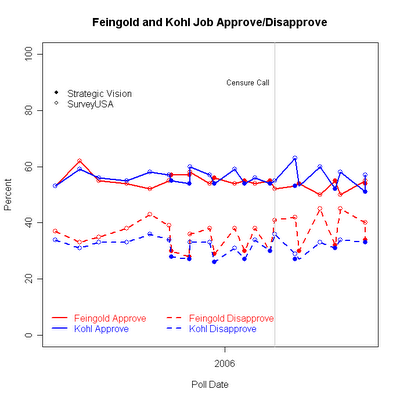
Wisconsin Senator Russ Feingold has gained a good deal of national publicity with his March 12 call for the censure of President Bush, and more recently with the Kerry-Feingold resolution for withdrawal of U.S. troops from Iraq. These positions have gained Feingold visibility and considerable enthusiasm from Democrats who think the party has been wimpy in response to the war and other administration initiatives. I wrote a while back about the considerable bounce in fundraising for Feingold's PAC following the censure proposal here and here.
In today's Milwaukee Journal-Sentinel, Washington correspondent Craig Gilbert writes about the effect of Feingold's actions on his support at home. Gilbert asked me to comment on the trends for Feingold, so naturally I had to make a graph. I also thought it would be good to compare Feingold with Wisconsin's other Senator, Herb Kohl who has not been so outspoken on these issues. The result is the graph above. The data are from Strategic Vision and from SurveyUSA's 50 state tracking poll. The period covered in May 2005 through July 2006.
The bottom line is that Feingold and Kohl track each other very closely in job approval. Feingold has averaged 54.5% approval and Kohl 56.1%. Feingold's disapproval is a bit higher at 36.1% while Kohl's is 31.6%. But the important point is that there is no evidence at all that Feingold's censure proposal or subsequent outspoken calls for troop withdrawal has had any effect, either positive or negative, on his approval back home. The trend in Feingold's approval is about as close to flat as it can be, and that doesn't change after the March 12 censure call. There is a statistically insignificant shift down after March 12, by -1.8% but that has been made up by an equally tiny and equally insignificant positive trend in approval after that. The simple story the data tell is that the best fit to this trend is a flat line at 54.5% approval.
Feingold's disapproval rate has shown a very slight upward trend, not statistically significant, but not so far from it as with approval. But again, there is absolutely no evidence that that trend shifted at all after March 12.
Kohl's trends similarly show no systematic shift. His approval has a non-significant slight upward trend but no evidence that this changed when his junior colleague made his proposals. If anything, it is striking how similar Kohl and Feingold's approval records are. Feingold has faced serious electoral competition while Kohl has faced generally weaker opponents, yet Kohl is not much more popular than Feingold.
So not much effect. But let's also look at it another way. In the rest of the country, Feingold has benefited significantly from his outspoken positions, at least among liberal/progressive Democratic constituencies. His possible bid for the presidency hasn't soared to first place, but he has moved out of the low single digits into the high sigle digits in many polls. And his blogosphere support seems to have risen substantially. So given that, why isn't there any impact back home?
My guess is that here in Wisconsin we've had 14 years to get to know Feingold. Many Dems love him, and many Reps hate him, but both sides know him well enough to no longer be surprised by his positions or his willingness to speak out when others are more timid. The rest of the country is just beginning to know who this guy is, and for them, the signals Feingold is sending are entirely "new" information. The result is some modest but meaningful change in polling in primary states or in national measures of presidential preferences. So far, at least, that has worked to Feingold's advantage nationally as at least a small share of progressive Democrats have been taken by him. Of course there is also considerable opposition to his positions, but that hasn't hurt him nationally, at least not yet, and apparently not back home either.
Click here to go to Table of Contents